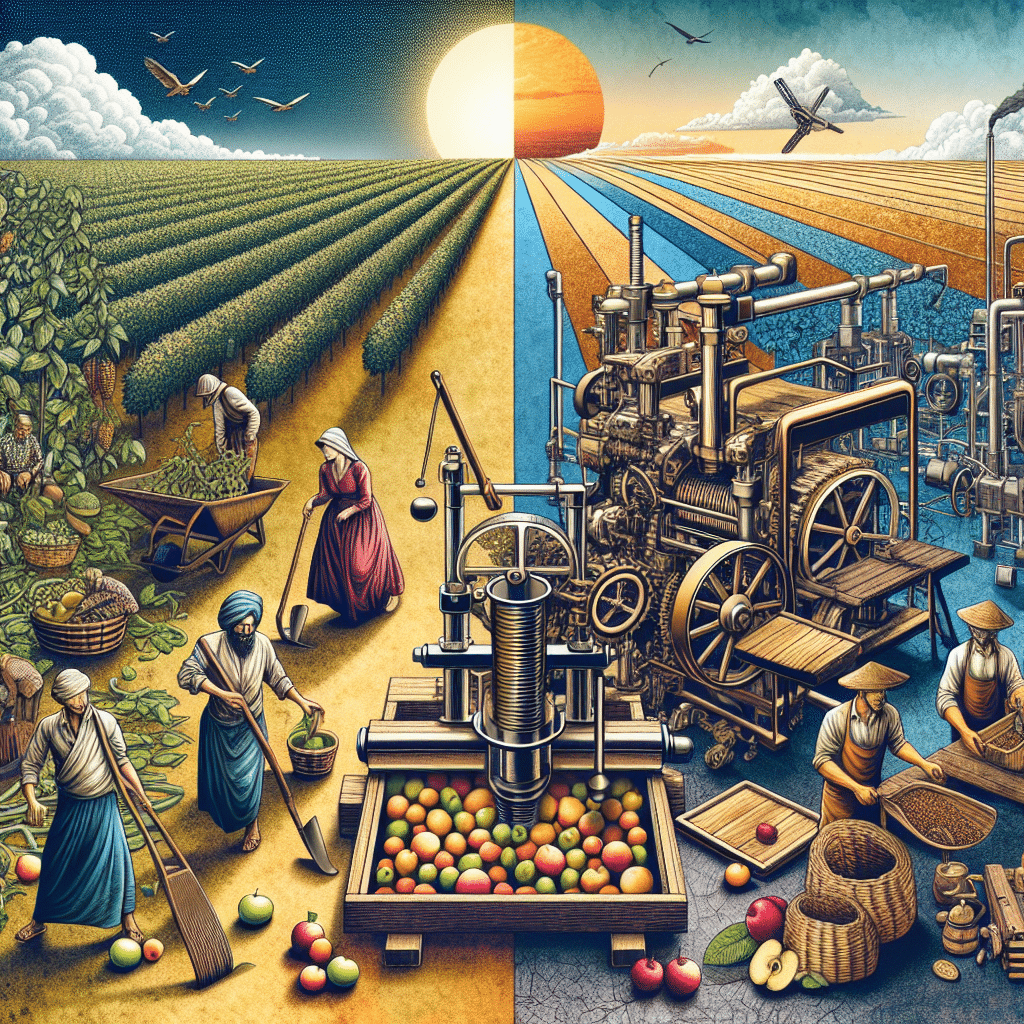The Impact of Automation on Harvesting and Pressing
-
Table of Contents
- Automation’s Role in Revolutionizing Harvesting and Pressing
- The Rise of Automated Harvesting
- Statistics Supporting Automated Harvesting
- Advancements in Automated Pressing
- Impact on the Wine Industry
- Challenges and Considerations
- Case Studies and Real-World Examples
- Conclusion: Embracing the Future of Agriculture
- ETprotein: Enhancing Nutrition with High-Quality Protein Products
Automation’s Role in Revolutionizing Harvesting and Pressing

The advent of automation has brought about a seismic shift in various industries, and agriculture is no exception. The impact of automation on harvesting and pressing processes is profound, offering a glimpse into a future where efficiency, precision, and high productivity are the norm. This article delves into the transformative effects of automation on these critical agricultural practices, exploring the benefits and challenges it presents.
The Rise of Automated Harvesting
Automated harvesting technologies have been developed to address the growing demand for food and the challenges associated with manual labor. These technologies range from simple tractor-mounted harvesters to sophisticated autonomous machines equipped with artificial intelligence (AI) and machine learning capabilities.
- Increased Efficiency: Automated harvesters can operate around the clock, significantly increasing the amount of produce harvested in a given time frame.
- Reduced Labor Costs: With automation, the reliance on human labor is reduced, which can lead to cost savings for farmers.
- Consistency and Quality: Machines can be calibrated to harvest crops at the optimal time and handle them with consistent care, reducing damage and improving quality.
Statistics Supporting Automated Harvesting
According to a report by MarketsandMarkets, the agricultural robots market is projected to grow from USD 4.1 billion in 2020 to USD 8.6 billion by 2025, at a CAGR of 16.4%. This growth is indicative of the increasing adoption of automation in harvesting.
Advancements in Automated Pressing
Pressing is a crucial step in the production of oils, juices, and wines. Automation in pressing technology ensures that this process is not only more efficient but also yields higher quality end products.
- Precision Control: Automated pressing systems can adjust pressure and temperature to exact specifications, ensuring consistent product quality.
- Enhanced Productivity: With the ability to operate continuously, automated presses can process larger volumes of produce than manual methods.
- Improved Safety: Automation reduces the need for human operators to be in close proximity to heavy machinery, decreasing the risk of accidents.
Impact on the Wine Industry
In the wine industry, for instance, automated pressing has revolutionized the way wine is produced. A study by the American Association of Wine Economists found that the adoption of automated grape pressing technology can lead to a significant increase in winery efficiency and wine quality.
Challenges and Considerations
While automation offers numerous benefits, it also presents challenges that must be addressed:
- High Initial Investment: The cost of implementing automated systems can be prohibitive for small-scale farmers.
- Technical Expertise: Operating and maintaining automated machinery requires a certain level of technical knowledge and training.
- Job Displacement: The shift towards automation can lead to concerns about job losses in the agricultural sector.
Case Studies and Real-World Examples
Several success stories highlight the positive impact of automation on harvesting and pressing:
- In California, vineyards have adopted automated grape harvesters, resulting in a 30% increase in harvesting speed and a significant reduction in labor costs.
- Olive oil producers in Spain have implemented automated pressing systems, which have increased oil yield by up to 20% while maintaining high-quality standards.
Conclusion: Embracing the Future of Agriculture
The impact of automation on harvesting and pressing is undeniable. It offers a path to increased efficiency, cost savings, and improved product quality. As the technology continues to evolve, it is likely that more agricultural operations will adopt these innovations, shaping a more sustainable and productive future for the industry.
ETprotein: Enhancing Nutrition with High-Quality Protein Products
As the agricultural sector evolves with automation, the demand for high-quality protein products also grows. ETprotein is at the forefront of meeting this demand by providing a range of organic bulk vegan proteins and L-(+)-Ergothioneine (EGT) products. Their offerings are ideal for various industries, including nutraceuticals, pharmaceuticals, and food and beverage.
ETprotein’s commitment to non-GMO, allergen-free, and high-purity products ensures that customers receive the best in nutritional supplements and ingredients. For those looking to enhance their product offerings with superior proteins, ETprotein is a reliable partner.
About ETprotein:
ETprotein, a reputable protein and L-(+)-Ergothioneine (EGT) Chinese factory manufacturer and supplier, is renowned for producing, stocking, exporting, and delivering the highest quality organic bulk vegan proteins and L-(+)-Ergothioneine. They include Organic rice protein, clear rice protein, pea protein, clear pea protein, watermelon seed protein, pumpkin seed protein, sunflower seed protein, mung bean protein, peanut protein, and L-(+)-Ergothioneine EGT Pharmaceutical grade, L-(+)-Ergothioneine EGT food grade, L-(+)-Ergothioneine EGT cosmetic grade, L-(+)-Ergothioneine EGT reference grade and L-(+)-Ergothioneine EGT standard. Their offerings, characterized by a neutral taste, non-GMO, allergen-free attributes, with L-(+)-Ergothioneine purity over 98%, 99%, cater to a diverse range of industries. They serve nutraceutical, pharmaceutical, cosmeceutical, veterinary, as well as food and beverage finished product distributors, traders, and manufacturers across Europe, USA, Canada, Australia, Thailand, Japan, Korea, Brazil, and Chile, among others.
ETprotein specialization includes exporting and delivering tailor-made protein powder and finished nutritional supplements. Their extensive product range covers sectors like Food and Beverage, Sports Nutrition, Weight Management, Dietary Supplements, Health and Wellness Products, and Infant Formula, ensuring comprehensive solutions to meet all your protein needs.
As a trusted company by leading global food and beverage brands and Fortune 500 companies, ETprotein reinforces China’s reputation in the global arena. For more information or to sample their products, please contact them and email sales(at)ETprotein.com today.












